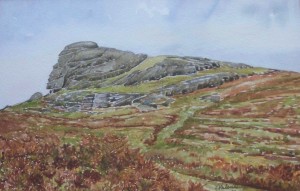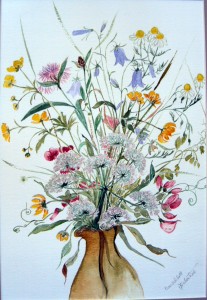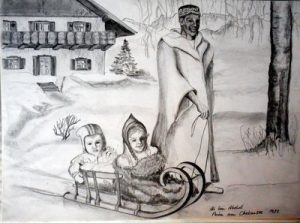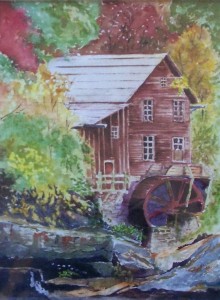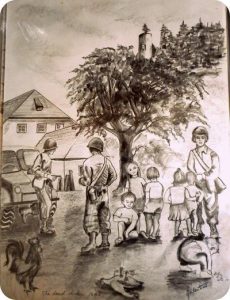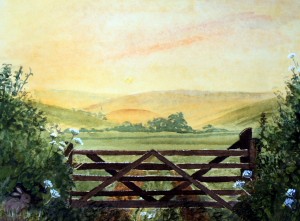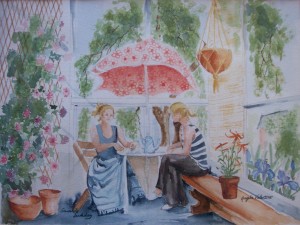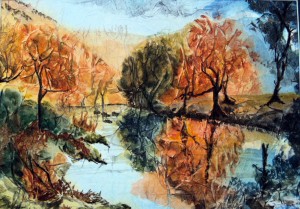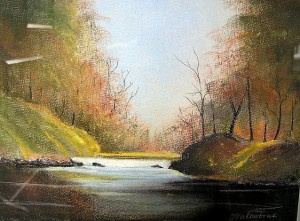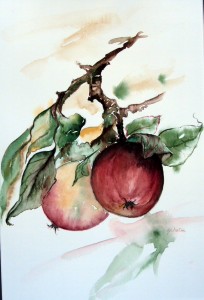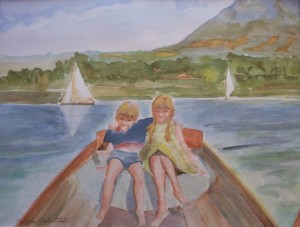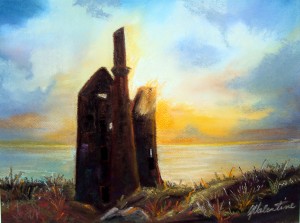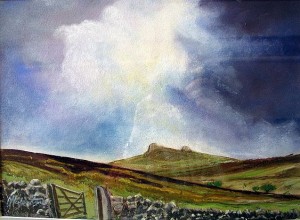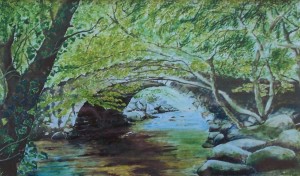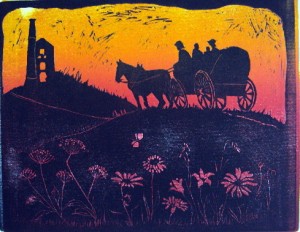Angela Valentine
ARTIST, WRITER, WORLD TRAVELLER & MOTHER
Meet Angela Valentine
After leaving school at age 16, August 1952, Angela Valentine worked as an agricultural apprentice. After three years, she passed her test and entered the Agricultural College in Regensburg.
After graduating Angela spent three years in Finland, England and Ireland. When she returned, she went to Business college and ended up working for the German Railways in Basel. She later went on to London to work for the German airline, Lufthansa for ten years.
She married a New Zealander and had two children, Sarah and Peter. Once Angela’s children had grown up and left home, she started producing small wooden furniture. Later, she worked and managed an art and craft shop.
Angela’s true passion is writing and painting and she continues to do that most days. The Dark Edge of the Rainbow is her debut novel.
“Art is life and life is something beautiful”

Meet Angela Valentine

“Art is life and life is something beautiful”
After leaving school at age 16, August 1952, Angela Valentine worked as an agricultural apprentice. After three years, she passed her test and entered the Agricultural College in Regensburg.
After graduating Angela spent three years in Finland, England and Ireland. When she returned, she went to Business college and ended up working for the German Railways in Basel. She later went on to London to work for the German airline, Lufthansa for ten years.
She married a New Zealander and had two children, Sarah and Peter. Once Angela’s children had grown up and left home, she started producing small wooden furniture. Later, she worked and managed an art and craft shop.
Angela’s true passion is writing and painting and she continues to do that most days. The Dark Edge of the Rainbow is her debut novel.
The Dark Edge of the Rainbow
By Angela Valentine
The Dark Edge of the Rainbow, is a moving and at times, heart breaking account of an ordinary family, living through World War Two.
From the eerie moment they find out they are at war to the telegrams they receive and their constant change of home.
Three children under ten and one brave mother are tested to the brink, but through all this, are constantly there for each other as they learn how to survive and find joy in the strangest places.
You will be glad you picked this book up.
Chapter 1
The rain had stopped and grey clouds were racing across a blue sky, chased by brilliant sunshine, sleet and snow. It was cold outside, Mother had put on her warm coat and boots. She had to go to feed the rabbits in our garden, and left me in charge of my two little sisters.
I was standing by the window, resting my chin on the windowsill looking out, feeling very bored. The weather wasn’t nice enough to be outside. I had lifted the lace curtain over my head to get a better view of the clouds as they hurried across the sky. The strong wind changed their shape constantly. I turned round and through the patterns of the curtains I watched Bine and Tissi.
Before Mother left, she had put Tissi on the pot. She was a nervous baby and soiled her nappies as soon as she heard the siren or the doorbell. A constant string of nappies hung to dry in the bathroom, and to save even more nappies, Tissi spent a lot of time on the pot, surrounded by her toys with Bine or myself playing with her. She was wrapped in a lovely pink blanket, which used to be my favourite, then Bine’s and now Tissi’s. It had fairy tale characters woven into it, like Snow White and the Seven Dwarfs, Dornröschen and the Froschkönig.
A strange noise made me look out of the window again. Suddenly, small and very dark grey clouds appeared. They just popped out of nowhere and there they were. Lots of them. I called Bine over and we watched together, fascinated. Each little cloud was accompanied with an ak sound. Ak-ak-ak. We tried to count them, but as soon as they appeared, the wind blew them away again. The sound was muffled through the double windows.
Another strange noise took our attention. Over the roofs of the apartment houses opposite, planes appeared, row upon row. A droning sound filled the air. Slowly, the sky darkened with these menacing planes, and just as we were trying to work out what they were, I heard the siren. A prickling went down my back. Tissi started crying, I looked at her. Mother hadn’t gone all that long ago. She would turn back and come home, surely.
How many raids had we survived? I looked back through the window. The first planes had disappeared over our roof and they were still advancing over the roofs opposite. How many were there? A hundred? At least a hundred. There were no gaps in the sky. Suddenly, one changed into a fiery ball and crashed into many pieces, behind the blocks opposite. Laboriously, the others continued to cross the sky over our street.
The Doorbell rang. Bine rushed to the door, yelling: “Mutti, Mutti”, but it was Frau Meier, Roland’s mother.
“Why aren’t you downstairs? Where is your mother?” Not waiting for an answer, she picked up Tissi, potty and all. Bine picked up some toys. I picked up the first aid case, which was always ready by the door and we went down into the cellar. As I came out of the back door, before turning into the basement shelter, I could see, that the blanket of planes, had disappeared over the horizon of the bombed and burnt out apartment blocks at the back and were still coming on, overhead. The air was filled with snarling engine noises. Hypnotised, I watched.
Frau Meier shouted: “Come quickly, don’t stand there. You’ll get killed.” I turned and ran down the stairs into the basement shelter. Where were so many planes headed? What was the target? Where was Mother? I listened to every little noise. Frau Meier asked again where Mother was, and I said: “She has gone to feed the Angora’s. Will she be alright?” Frau Meier nodded her head.
“She has gone into somebody else’s shelter. Anywhere between here and the Colony.” (We called all the gardens the Colony). Frau Pfeiffer, from the second f loor, put new nappies on Tissi. She was still fretting, I went over and put my arm around her. Bine’s eyes were dark and huge. She was watching everybody and although she said nothing I could read her question. Where was Mother? I took Bine’s hand, there was safety and reassurance in just sticking together. The din outside had become deafening. There was the smell of cement and dust trickling from the ceiling. We had all landed on the floor involuntarily. The three of us huddled together, Frau Meier close with Roland. The other members of the apartments above, also huddled on benches along the wall, barely visible in the dingy light.
Suddenly, it was very still outside. Nothing could be heard and no one uttered a word. Then the door was f lung open and Mother rushed in. She was out of breath, bleeding slightly on her forehead, her clothes were torn, and she was very dirty.
She put out her arms and Bine and I f lew into them: “Where were you?”
She put her hand up to the mass of plaited hair, which was hanging down her back, pins sticking out here and there. She tried hard to pin it up again.
“I ducked from doorway to doorway, but I got hit by small pieces of shrapnel. It looks as though they are attacking Tempelhof again. But where they are going with all those planes, goodness knows.” The neighbours asked a lot more questions. Frau Meier was cross with Mother, because she came back in that hellish inferno.
“You know we will always look after the children, we would have been quicker had we known you were not here.”
“I didn’t think there would be a raid so soon again and I simply had to come back for the children. The rabbits have to go. I cannot leave the children again.”
We loved the rabbits, their soft, warm fur and strawberry red eyes. Their twitching pink noses when they ate. Bine’s eyes filled with silent tears, and my heart sank. “It is much better they go, Kinderchen, they are not safe in the garden here in the city. We take them to Silesia.”
Mother went over to the bunkbeds and fetched the Grimms Fairy Tales book. Roland came too, and we all settled down to listen, including the adults. Mother read the story of someone who went forth to learn how it feels to make his flesh creep. The chap in the story was fearless. His bravery knew no bounds, and his adventures were horrific, and still he had not learned what fear was. Nothing made his flesh creep. Eventually, he met a miller who hired him as an apprentice. While they were all sitting down for the evening meal, he told the family of his quest, and how he had wandered through the world and still had not yet learned what fear was. That night, the miller’s daughter went out and filled a bucket from the cold stream with water. She had also inadvertently caught some tiny fishes in her bucket. She poured the bucket over the sleeping lad, who woke up shuddering and said: “Why, now I know what it feels like.”
We thought this story was a little strange, but also funny, and asked for it often.
The book of ‘Grimms Fairy Tales’ was part of the first aid kit and always came with us into the cellar and made the time we spent there more cosy. It made us forget what was going on outside. Half way through the next story, the siren announced the end of the raid. We went straight upstairs and Mother started to cook lunch. We were so hungry. We all sat in the kitchen quietly, watching her.
“Minka, go and lay the table, Bine can help.” she said, but Bine had a very special knack of suddenly and quietly disappearing.
This meal was only potato soup with lots of parsley in it. We added a lot of Maggi, which was always on the table. We added it to everything. Normally, lunch would have been a vegetable stew with any amount of vegetable from the garden plus potatoes, and for the evening meal, two slices of bread with either cheese, or jam, or Kunsthonig which was the best thing we could buy. It was artificial honey and came in blocks and was simply delicious.
In the mornings, we were bribed with Kunsthonig to have one spoon of cod liver oil. I retched every time I swallowed that. We had just settled down to our meal when the bell rang. Mother opened the door and we could hear voices. After what seemed, to us children, a long time, Mother came back, very upset.
The colony had been hit by several bombs. Frau Sauer had been buried under her garden house, Emil was dead too. He had been on his way to Frau Sauer, when he was killed. They were our next door neighbours in the colony. Omi Pless, an old lady whom we had befriended and called Granny Pless, had been hit and wounded. She couldn’t get to the shelter in time. I could not imagine Emil and Frau Sauer dead. They had been there on the day when Mother first wheeled me into our garden in the ancient pram.
Read an Extract
The Dark Edge of the Rainbow, is a moving and at times, heart breaking account of an ordinary family, living through World War Two.
You can read the first chapter right here.
Read an Extract
The Dark Edge of the Rainbow, is a moving and at times, heart breaking account of an ordinary family, living through World War Two.
You can read the first chapter right here.
Chapter 1
The rain had stopped and grey clouds were racing across a blue sky, chased by brilliant sunshine, sleet and snow. It was cold outside, Mother had put on her warm coat and boots. She had to go to feed the rabbits in our garden, and left me in charge of my two little sisters.
I was standing by the window, resting my chin on the windowsill looking out, feeling very bored. The weather wasn’t nice enough to be outside. I had lifted the lace curtain over my head to get a better view of the clouds as they hurried across the sky. The strong wind changed their shape constantly. I turned round and through the patterns of the curtains I watched Bine and Tissi.
Before Mother left, she had put Tissi on the pot. She was a nervous baby and soiled her nappies as soon as she heard the siren or the doorbell. A constant string of nappies hung to dry in the bathroom, and to save even more nappies, Tissi spent a lot of time on the pot, surrounded by her toys with Bine or myself playing with her. She was wrapped in a lovely pink blanket, which used to be my favourite, then Bine’s and now Tissi’s. It had fairy tale characters woven into it, like Snow White and the Seven Dwarfs, Dornröschen and the Froschkönig.
A strange noise made me look out of the window again. Suddenly, small and very dark grey clouds appeared. They just popped out of nowhere and there they were. Lots of them. I called Bine over and we watched together, fascinated. Each little cloud was accompanied with an ak sound. Ak-ak-ak. We tried to count them, but as soon as they appeared, the wind blew them away again. The sound was muffled through the double windows.
Another strange noise took our attention. Over the roofs of the apartment houses opposite, planes appeared, row upon row. A droning sound filled the air. Slowly, the sky darkened with these menacing planes, and just as we were trying to work out what they were, I heard the siren. A prickling went down my back. Tissi started crying, I looked at her. Mother hadn’t gone all that long ago. She would turn back and come home, surely.
How many raids had we survived? I looked back through the window. The first planes had disappeared over our roof and they were still advancing over the roofs opposite. How many were there? A hundred? At least a hundred. There were no gaps in the sky. Suddenly, one changed into a fiery ball and crashed into many pieces, behind the blocks opposite. Laboriously, the others continued to cross the sky over our street.
The Doorbell rang. Bine rushed to the door, yelling: “Mutti, Mutti”, but it was Frau Meier, Roland’s mother.
“Why aren’t you downstairs? Where is your mother?” Not waiting for an answer, she picked up Tissi, potty and all. Bine picked up some toys. I picked up the first aid case, which was always ready by the door and we went down into the cellar. As I came out of the back door, before turning into the basement shelter, I could see, that the blanket of planes, had disappeared over the horizon of the bombed and burnt out apartment blocks at the back and were still coming on, overhead. The air was filled with snarling engine noises. Hypnotised, I watched.
Frau Meier shouted: “Come quickly, don’t stand there. You’ll get killed.” I turned and ran down the stairs into the basement shelter. Where were so many planes headed? What was the target? Where was Mother? I listened to every little noise. Frau Meier asked again where Mother was, and I said: “She has gone to feed the Angora’s. Will she be alright?” Frau Meier nodded her head.
“She has gone into somebody else’s shelter. Anywhere between here and the Colony.” (We called all the gardens the Colony). Frau Pfeiffer, from the second f loor, put new nappies on Tissi. She was still fretting, I went over and put my arm around her. Bine’s eyes were dark and huge. She was watching everybody and although she said nothing I could read her question. Where was Mother? I took Bine’s hand, there was safety and reassurance in just sticking together. The din outside had become deafening. There was the smell of cement and dust trickling from the ceiling. We had all landed on the floor involuntarily. The three of us huddled together, Frau Meier close with Roland. The other members of the apartments above, also huddled on benches along the wall, barely visible in the dingy light.
Suddenly, it was very still outside. Nothing could be heard and no one uttered a word. Then the door was f lung open and Mother rushed in. She was out of breath, bleeding slightly on her forehead, her clothes were torn, and she was very dirty.
She put out her arms and Bine and I f lew into them: “Where were you?”
She put her hand up to the mass of plaited hair, which was hanging down her back, pins sticking out here and there. She tried hard to pin it up again.
“I ducked from doorway to doorway, but I got hit by small pieces of shrapnel. It looks as though they are attacking Tempelhof again. But where they are going with all those planes, goodness knows.” The neighbours asked a lot more questions. Frau Meier was cross with Mother, because she came back in that hellish inferno.
“You know we will always look after the children, we would have been quicker had we known you were not here.”
“I didn’t think there would be a raid so soon again and I simply had to come back for the children. The rabbits have to go. I cannot leave the children again.”
We loved the rabbits, their soft, warm fur and strawberry red eyes. Their twitching pink noses when they ate. Bine’s eyes filled with silent tears, and my heart sank. “It is much better they go, Kinderchen, they are not safe in the garden here in the city. We take them to Silesia.”
Mother went over to the bunkbeds and fetched the Grimms Fairy Tales book. Roland came too, and we all settled down to listen, including the adults. Mother read the story of someone who went forth to learn how it feels to make his flesh creep. The chap in the story was fearless. His bravery knew no bounds, and his adventures were horrific, and still he had not learned what fear was. Nothing made his flesh creep. Eventually, he met a miller who hired him as an apprentice. While they were all sitting down for the evening meal, he told the family of his quest, and how he had wandered through the world and still had not yet learned what fear was. That night, the miller’s daughter went out and filled a bucket from the cold stream with water. She had also inadvertently caught some tiny fishes in her bucket. She poured the bucket over the sleeping lad, who woke up shuddering and said: “Why, now I know what it feels like.”
We thought this story was a little strange, but also funny, and asked for it often.
The book of ‘Grimms Fairy Tales’ was part of the first aid kit and always came with us into the cellar and made the time we spent there more cosy. It made us forget what was going on outside. Half way through the next story, the siren announced the end of the raid. We went straight upstairs and Mother started to cook lunch. We were so hungry. We all sat in the kitchen quietly, watching her.
“Minka, go and lay the table, Bine can help.” she said, but Bine had a very special knack of suddenly and quietly disappearing.
This meal was only potato soup with lots of parsley in it. We added a lot of Maggi, which was always on the table. We added it to everything. Normally, lunch would have been a vegetable stew with any amount of vegetable from the garden plus potatoes, and for the evening meal, two slices of bread with either cheese, or jam, or Kunsthonig which was the best thing we could buy. It was artificial honey and came in blocks and was simply delicious.
In the mornings, we were bribed with Kunsthonig to have one spoon of cod liver oil. I retched every time I swallowed that. We had just settled down to our meal when the bell rang. Mother opened the door and we could hear voices. After what seemed, to us children, a long time, Mother came back, very upset.
The colony had been hit by several bombs. Frau Sauer had been buried under her garden house, Emil was dead too. He had been on his way to Frau Sauer, when he was killed. They were our next door neighbours in the colony. Omi Pless, an old lady whom we had befriended and called Granny Pless, had been hit and wounded. She couldn’t get to the shelter in time. I could not imagine Emil and Frau Sauer dead. They had been there on the day when Mother first wheeled me into our garden in the ancient pram.
Art Gallery
I also do pastel work, watercolours and acrylic. My husband was a Dartmoor Guide and we do a lot of walking in Devon, the Lakes, Cornwall and Northumbria. My inspiration comes from our walks.
Get in touch
If you would like to enquire about my book or artwork please get in touch.



